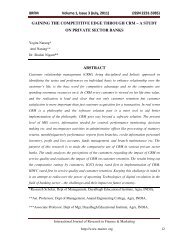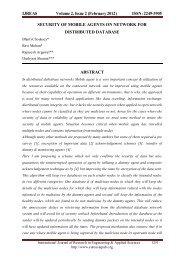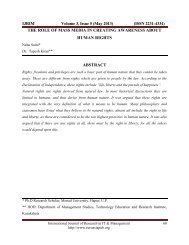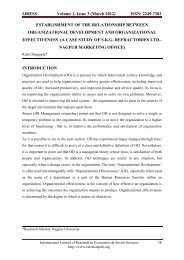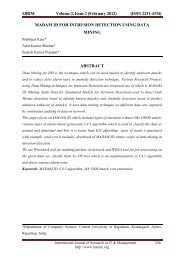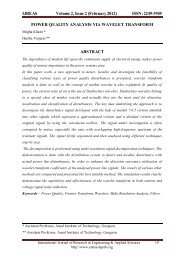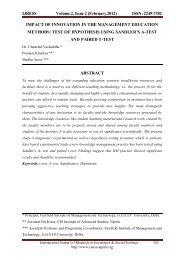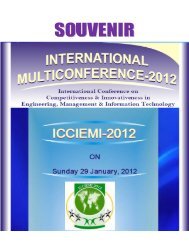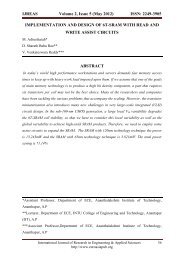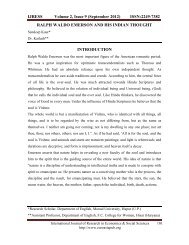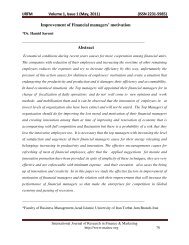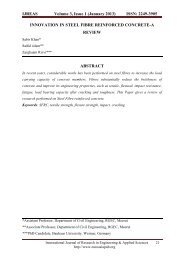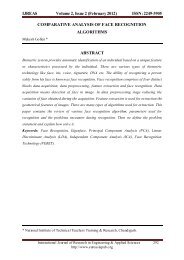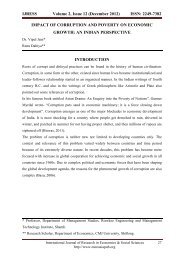the mayor and tess: mounting will, dismounting fate elements of fate ...
the mayor and tess: mounting will, dismounting fate elements of fate ...
the mayor and tess: mounting will, dismounting fate elements of fate ...
You also want an ePaper? Increase the reach of your titles
YUMPU automatically turns print PDFs into web optimized ePapers that Google loves.
IJREAS Volume 3, Issue 6 (June 2013) ISSN: 2249-3905THE MAYOR AND TESS: MOUNTING WILL, DISMOUNTING FATEELEMENTS OF FATE IN MAYOR OF CASTERBRIDGE ANDTESS OF D’URBERVILLESSurabhi*Critics are mainly agreed that Thomas Hardy's The Mayor <strong>of</strong> Casterbridge <strong>and</strong> Tess <strong>of</strong>D’Urbervilles are based on <strong>the</strong> tragic pattern. Moreover, <strong>the</strong>y are also agreed with <strong>the</strong> fact whatmakes <strong>the</strong>se two novels fact what makes <strong>the</strong>se two novels tragedy. In o<strong>the</strong>r words, <strong>fate</strong> is <strong>the</strong>only element, skillfully h<strong>and</strong>led <strong>and</strong> employed by Hardy, to govern <strong>the</strong> lives <strong>of</strong> <strong>the</strong> centralcharacters, Henchard <strong>and</strong> Tess in <strong>the</strong>se two novels. Ted R. Spivey relates Hardy's novels nei<strong>the</strong>rto <strong>the</strong> strivings <strong>of</strong> modernity nor to <strong>the</strong> folk, but to certain specifically literary trends in <strong>the</strong> 19thcentury. "Tragedy for Hardy is <strong>the</strong> defeat <strong>of</strong> <strong>the</strong> romantic hero's desire to reach a higher spiritualstate. Hardy's tragic figures are romantic heroes in <strong>the</strong> line <strong>of</strong> Manfred, Faust, Prome<strong>the</strong>us <strong>and</strong>Heathcliff” (188). Therefore, <strong>the</strong> present, paper attempts to explore Hardy's two novels in adifferent perspective where his characters are seen being driven by <strong>the</strong>ir own <strong>will</strong> <strong>and</strong> passionbut eventually defeated by <strong>the</strong>ir own <strong>fate</strong> to catastrophe.It has been seen that <strong>fate</strong> in The Mayor <strong>of</strong> Casterbridge <strong>and</strong> Tess appears in a different form,sometimes as a natural force <strong>and</strong> o<strong>the</strong>r times as an inner weakness <strong>of</strong> <strong>the</strong> hero. The Mayor(1886), freed from disabling humanistic biases <strong>of</strong> his age, exploits a level <strong>of</strong> <strong>the</strong> mind. "Hardy,receiving a body <strong>of</strong> beliefs about man <strong>and</strong> <strong>fate</strong>, he exploits a wisdom that makes possible <strong>the</strong>achievement <strong>of</strong> tragedy in <strong>the</strong> heroically sense <strong>of</strong> a Sophocles or a Shakespeare" (151). MichaelHenchard, <strong>the</strong> hero, arrives at <strong>the</strong> fair at Weydon- Priors, steeps himself in <strong>the</strong> alcoholic brews <strong>of</strong><strong>the</strong> furmity-woman <strong>and</strong> in a drunken moment, sells his wife to a sailor for five guineas.Henchard takes his futility from <strong>the</strong> wealth. The novel opens with:The born on <strong>the</strong> upl<strong>and</strong> side <strong>of</strong> <strong>the</strong> borough was generated by farmers who lived in aneastern purview called Durnover (The Mayor, 30).*Astt. Pr<strong>of</strong>., KITM, KurukshetraInternational Journal <strong>of</strong> Research in Engineering & Applied Sciences 44http://www.euroasiapub.org
IJREAS Volume 3, Issue 6 (June 2013) ISSN: 2249-3905The opening <strong>of</strong> <strong>the</strong> novel establishes a situation which seems to <strong>of</strong>fer hope for Herchard'ssuccess following <strong>the</strong> brief prefatory account <strong>of</strong> his economic <strong>and</strong> moral nucleus <strong>and</strong> his <strong>will</strong> tomake a start in a new direction" (The Mayor, 115). He is shown continuously to grasping <strong>the</strong>power. Hardy uses both action <strong>and</strong> authorial comments to shift reader’s impression <strong>of</strong>Henchard's moral structure in a curve which parallels his economic rise <strong>and</strong> fall against Farfrae.His <strong>will</strong> keeps moving to serve what seems to be larger moral order in <strong>the</strong> world. He himselfcomes to feel some intelligent power 'bent on punishing him." (The Mayor, 271) against his <strong>will</strong>.The au<strong>the</strong>nticity <strong>of</strong> a moral intelligence beyond man's power to control is verified in <strong>the</strong> heroicimagination <strong>of</strong> Henchard himself. Henchard's career st<strong>and</strong>s out as a testimony for <strong>the</strong> familiar<strong>and</strong> hard beliefs that <strong>the</strong> wise <strong>and</strong> <strong>the</strong> good shall prosper <strong>and</strong> wicked <strong>and</strong> rash shall fall against<strong>the</strong>ir <strong>mounting</strong> <strong>will</strong>. Hardy clearly intends to leave no doubt about his rise <strong>and</strong> fall. "On <strong>the</strong> dayalmost at that time- he passed <strong>the</strong> ridge <strong>of</strong> prosperity <strong>and</strong> honour <strong>and</strong> began to descend rapidly on<strong>the</strong> o<strong>the</strong>r side" (The Mayor, 311). Therefore, Hench<strong>and</strong>'s terrible retrogression obeys a law asdistinct <strong>and</strong> irrefutable in its logic as to suggest an origin more supernatural, which is called <strong>fate</strong>,than natural. Paterson recounts, "Reduced to <strong>the</strong> humble trade with which he began, discarding<strong>the</strong> shabby genteel suit <strong>of</strong> cloth <strong>and</strong> <strong>the</strong> rusty silk hat which had <strong>the</strong> emblem <strong>of</strong> his illegitimatepower, taking again to <strong>the</strong> drink he had twenty years before his repudiated, leaving exactly as hehad entered it, revisiting Waydon-Priors. The scene <strong>of</strong> <strong>the</strong> original crime <strong>and</strong> dying at last,broken in body <strong>and</strong> spirit, on <strong>the</strong> barren wastes <strong>of</strong> Edgon Heath, Henchard travels with everystage <strong>of</strong> his decline <strong>and</strong> fall <strong>the</strong> road by which he had come, embraces with every step <strong>the</strong> past hehad denied…" (161). Despite all <strong>the</strong> impossibilities, Hardy's genius asserted itself in <strong>the</strong> making<strong>of</strong> a Michael Henchard as a man <strong>of</strong> strong <strong>will</strong>. Having suffered odds <strong>and</strong> vicissitudes, he movescloser to Aristotle's definition <strong>of</strong> a tragic hero. Henchard undergoes rebuffs that appear in excess<strong>of</strong> what his original crime dem<strong>and</strong>s, <strong>and</strong> his punishment appears more than what a basicallydescent man deserves.I can go alone as I deserve an outcast <strong>and</strong> a vagabond. But my punishment is notgreater than I hear (The Mayor, 325).In this way, <strong>the</strong> preceding argument establishes that <strong>the</strong> nail, portrays a battle between man's <strong>will</strong><strong>and</strong> <strong>the</strong> nature because man can never be sure <strong>of</strong> himself like <strong>the</strong> Greek hero.Like that <strong>of</strong> The Mayor Hardy has been successful in portraying Tess as a girl who fights withher circumstances but gets defeated by <strong>the</strong> <strong>fate</strong> in Tess <strong>of</strong> D’urberville. Douglas Brown says,International Journal <strong>of</strong> Research in Engineering & Applied Sciences 45http://www.euroasiapub.org
IJREAS Volume 3, Issue 6 (June 2013) ISSN: 2249-3905“Here is not merely <strong>the</strong> tragedy <strong>of</strong> a heroic girl, but <strong>the</strong> tragedy <strong>of</strong> a proud community baffled<strong>and</strong> defeated by a process beyond its underst<strong>and</strong>ing control”. (90).What makes this novel a tragic story is not <strong>the</strong> involvement <strong>of</strong> Tess's fine spirit in a degradingstory <strong>of</strong> reduction <strong>and</strong> revenge. Ra<strong>the</strong>r, it is <strong>the</strong> meaningfulness <strong>of</strong> life considered as <strong>the</strong> story <strong>of</strong>a victim <strong>of</strong> her <strong>will</strong> <strong>and</strong> a scapegoat. J.R. Brooks places <strong>the</strong> story as, "<strong>the</strong> surface story <strong>of</strong> Tessnarrates <strong>the</strong> events that defeat her struggle for <strong>the</strong> personal happiness. But <strong>the</strong> poetic underpatternreveals <strong>the</strong> resolute purpose <strong>of</strong> <strong>the</strong> victim <strong>of</strong> circumstances <strong>and</strong> <strong>the</strong> doomed or sanctifiedbeing a more archetypal direction to her life hostile to personal claims" (439). In consideringTess as a victim <strong>of</strong> her own <strong>will</strong> <strong>and</strong> circumstances, <strong>the</strong> following pattern needs to be considered:(1) The society in which Tess suffers <strong>and</strong> die is sick with evil: it worships <strong>the</strong> false idol <strong>of</strong>chastity <strong>and</strong> is committed to a set <strong>of</strong> attitudes toward <strong>the</strong> fallen woman <strong>and</strong> toward sexuality ingeneral which are unnatural <strong>and</strong> harmful in extreme (2). Tess's sufferings, which arise in <strong>and</strong> arecaused by this social context, are at <strong>the</strong> very centre <strong>of</strong> attention, <strong>and</strong> <strong>the</strong> novel is to a great extentis simply <strong>the</strong> story <strong>of</strong> her sufferings (3) These are no villains, no really evil characters –Alec onesAngel, who between <strong>the</strong>m destroy Tess, are merely mediators <strong>of</strong> attitudes, habits <strong>and</strong> valuespresent in <strong>the</strong>ir society. (4) Tess’s suffering produces a good – if not <strong>the</strong> immediate regeneration<strong>of</strong> <strong>the</strong> society, at least <strong>the</strong> regeneration <strong>of</strong> Angel Clare, who spoke <strong>and</strong> acted for <strong>the</strong> conventions<strong>of</strong> society <strong>and</strong> who is said to be sample product <strong>of</strong> <strong>the</strong> last five <strong>and</strong> twenty years" (Tess, 235).Tess is so devastated between Alec <strong>and</strong> Angel in terms <strong>of</strong> mind <strong>and</strong> spirit that Angel, returningtoo late to find her installed in <strong>the</strong> lodging house as Alec's mistress, realizes that his original Tesshad spiritually ceased to recognizing <strong>the</strong> body before him as Tess <strong>the</strong> body before him as Tessallowing it to drift, like a corpse upon <strong>the</strong> current in a direction dissociated from its living <strong>will</strong>"(Tess,484).Though <strong>the</strong> novel is essentially <strong>the</strong> tragedy <strong>of</strong> characters who are <strong>the</strong> victims <strong>of</strong> <strong>fate</strong> or scapegoatbut this does not mean that <strong>the</strong> central figure is merely weak <strong>and</strong> helpless. On <strong>the</strong> contrary,though Tess's circumstances make her a victim, her nature is courageous <strong>and</strong> heroic. MechaelMillgate evaluates, “Tess may essential a <strong>the</strong> victim <strong>and</strong> we from an early stage feel that she isdoomed, if only because <strong>of</strong> what myths, ballads <strong>and</strong> melodramas have taught us to anticipate as<strong>the</strong> life pattern <strong>of</strong> <strong>the</strong> reduced country maiden" (279).It can be stated that Tess's sufferings are strongly emphasized in <strong>the</strong> novel. Nearly half <strong>of</strong> <strong>the</strong>novel is devoted to describing <strong>the</strong> instances <strong>of</strong> rejection, ostracism, misfortune <strong>and</strong> hard timesInternational Journal <strong>of</strong> Research in Engineering & Applied Sciences 46http://www.euroasiapub.org
IJREAS Volume 3, Issue 6 (June 2013) ISSN: 2249-3905related to her sin. Tess is made to “be a scapegoat by her <strong>fate</strong> because she alone suffers for whatmany o<strong>the</strong>r girls have gotten away with through compromise or secrecy. One's hopes at <strong>the</strong> end<strong>of</strong> <strong>the</strong> novel are focused upon <strong>the</strong> possibility that society, at large, <strong>will</strong> follow Angel's example inaccord with Hardy's general philosophy <strong>of</strong> evolutionary meliorism. Like <strong>the</strong> traditionalscapegoat, Tess is nei<strong>the</strong>r guilty nor innocent. "She is a purely typically or r<strong>and</strong>om victim <strong>of</strong> <strong>the</strong>circumstances her <strong>will</strong> framed around her", remarks Northrop Frye. (41).To sum up, it may be said that one has not a ward to say against <strong>the</strong> concept <strong>of</strong> <strong>will</strong> <strong>and</strong> forceworking behind <strong>the</strong> aspirations <strong>of</strong> The Mayor <strong>of</strong> Casterbrige <strong>and</strong> Tess <strong>of</strong> D’Urbervilles in <strong>the</strong>respective stories. The Mayor's rise <strong>and</strong> fall suggests that if one is an idealist, trying to exert his<strong>will</strong> in an antagonistic or indifferent world, <strong>the</strong>n this action creates a Prome<strong>the</strong>an conflict. And ifone is realist <strong>and</strong> does not attempt to change himself, his chances <strong>of</strong> destruction one minimized.In <strong>the</strong> same way, <strong>the</strong> character <strong>of</strong> Tess, up to her last downfall with some curious exceptions, isconsistent enough. Tess is <strong>the</strong> epitome <strong>of</strong> pure minded girl in whom lie <strong>the</strong> noblest possibilities<strong>of</strong> womanhood to carry out her <strong>will</strong>. But both <strong>of</strong> <strong>the</strong> characters seem to be wronged by <strong>the</strong>ir <strong>fate</strong>.REFERENCES:1. Brooks, J.R. Thomas Hardy: Poetic Structure ( London : Elek, 1971)2. Brown, Doughlas. Thomas Hardy ( London: Longman Green Company, 1967)3. Frye, Northrop. Anatomy <strong>of</strong> Criticism (London: Princeton, 1957)4. Hardy, Thomas. Tess <strong>of</strong> D'Urbervilles. Ed. Dale Skilton (London: Penguine, 1973)5. Hardy, Thomas. The Mayor <strong>of</strong> Casterbridge. Ed. Dale Crammer (London: Oxford UniversityPress, 2004)6. Millgate, Michael. Thomas Hardy: His Career as A Novelist (London: Macmillan, 1971)7. Spivey, Ted R. "Thomas Hardy's Tragic Heroes". Nineteenth Century Fiction, IX (1954)International Journal <strong>of</strong> Research in Engineering & Applied Sciences 47http://www.euroasiapub.org



